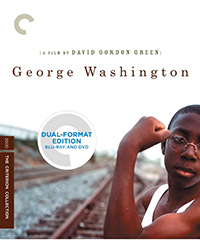 As director David Gordon Green returns to the mind frame of independent cinema with a duo of films like Prince Avalanche and (especially) the soon to be theatrically released Joe, Criterion revamps his 2000 feature debut, George Washington at a time that seems ripe for reexamination both in Gordon’s own eclectic filmography and the American independent film scene at large. Insomuch as snagging a slot in the Criterion lineup with a debut film, Green’s title is a definitive standout (Lena Dunham’s 2010 feature Tiny Furniture also comes immediately to mind), and after almost a decade and half later, we can look back and see a brilliant filmmaker already working a magic rarely seen in the independent realm both then and (even more notably) now.
As director David Gordon Green returns to the mind frame of independent cinema with a duo of films like Prince Avalanche and (especially) the soon to be theatrically released Joe, Criterion revamps his 2000 feature debut, George Washington at a time that seems ripe for reexamination both in Gordon’s own eclectic filmography and the American independent film scene at large. Insomuch as snagging a slot in the Criterion lineup with a debut film, Green’s title is a definitive standout (Lena Dunham’s 2010 feature Tiny Furniture also comes immediately to mind), and after almost a decade and half later, we can look back and see a brilliant filmmaker already working a magic rarely seen in the independent realm both then and (even more notably) now.
There is an omnipresent nostalgia to be felt while watching George Washington, whether it be your first viewing or one of several rewatches, as it concerns a group of kids, on that awkward cusp of childhood and adolescence, over the course of a summer that will change several of their lives and be etched in their memory (as well as ours). It recalls particular moments in time that many of us can relate to, those stretched out, never ending summer days where the hum of heat and time, insects and the outside, intersect in a concoction of memories we return to again and again. In this case we have a group of kids, black and white, who are marked by some rather dramatic events over one summer in the decay of an industrial rural landscape in North Carolina.
In between a host of intoxicating imagery, we experience the poetic narration of Nasia (Candace Evanofksi), who fills us in on details about each of our characters, including the titular George (Donald Holden), a lonely boy who is forced to wear a helmet and can’t get in the water because the “plates” in his skull haven’t seamed together. George is a rather quiet and observant boy, raised by his Aunt Ruth (Janet Taylor) and formidable but loving Uncle Damascus (Eddie Rouse). Concerning the adults in their small community, Nasia explains that “it’s hard for them to find their peace.” Recently, Nasia has called off her relationship with their friend Buddy (Curtis Cotton III), finding him too immature, preferring the company of the solemn George, who dreams of being a hero and letting the world know of his greatness. A surprising tragedy wreaks swift havoc on their idyll of days where they’re all just discovering themselves—this followed by an act of heroism that begins to define George.
Disc Review
Excitingly, Criterion includes three shorts that point to the origination of the film, including two of Green’s student shorts. Pleasant Grove (1997) provides the template, where we see George, several other main characters (including Paul Schneider) and several lines of dialogue that would be recycled. 1998’s Physical Pinball explores the relationship of a single dad (Eddie Rouse) with his adolescent daughter (Evanofski), both of whom Green would later cast in his feature. Lastly, a 1969 short directed by actor Clu Gulager, A Day With the Boys, which provided Green with the inspiration, is an exciting find indeed. Featuring DP Laszlo Kovacs, it’s a visual poem that plays like “Boys of Summer” meets Lord of the Flies. On top of that, Criterion includes a interesting interview with Green and Charlie Rose, a deleted scene from the film, and a 2001 cast reunion which sees the young actors already more grown, discussing how the film changed their lives. There’s also an essay from the infamous Armond White in the insert.
Final Thoughts
Compared to the visual poetry of Malick’s early works upon release (and it was reported that Green rewatched The Thin Red Line repeatedly before filming), George Washington is certainly of the same vein. But Green manages to strike an emotional potency with this piece, a casual, observational portrait of life and experience that isn’t always discernible in Malick. Green’s screenplay is peppered with memorable observations. When George’s aunt reminisces about how her husband use to make love to her in the grass upon hearing a familiar song, he responds, “Every time you start talking, you sound like you’re going to cry.” It’s exactly how Green conveys certain moments in his character’s lives that taps into that same emotional wavelength.
As charming and endearing as it is tragic, Green started out of the gate with a masterpiece of a film that defies expectations of what defines independent cinema—he shows us a landscape of life as it looks rather than trying too hard to instill dilemma or dramatic urgency. It’s something that he’s been able to repeat and channel in his other independent titles since, making him one of the most prolific American filmmakers today (it’s unfathomable to realize that he was 25 years old upon the release of this first feature). Expressive, distinct, and featuring a diverse roster of characters refreshingly exempt from standard formulas concerning race, George Washington has aged gracefully, a beautiful debut from a filmmaker that has something to say and the distinct style to present it.
Film: ★★★★ /☆☆☆☆☆
Disc: ★★★★ /☆☆☆☆☆


